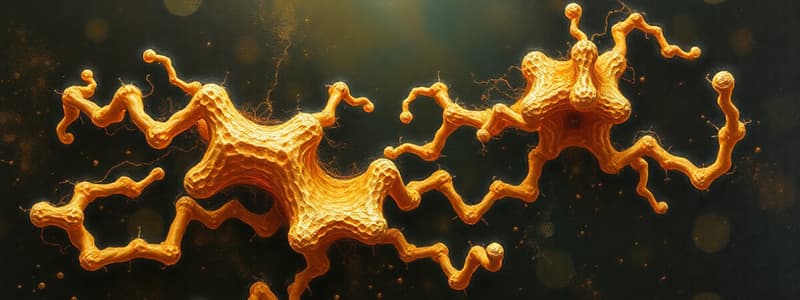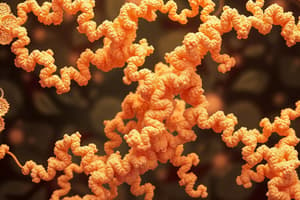Podcast
Questions and Answers
What is the molecular weight of Prealbumin?
What is the molecular weight of Prealbumin?
62 kDa
Prealbumin is an immature form of albumin.
Prealbumin is an immature form of albumin.
False (B)
Prealbumin has a longer half-life compared to albumin.
Prealbumin has a longer half-life compared to albumin.
False (B)
What is the primary function of Alpha1-Antitrypsin?
What is the primary function of Alpha1-Antitrypsin?
What is another name for Alpha1-Antitrypsin?
What is another name for Alpha1-Antitrypsin?
What is the molecular weight of Alpha1-Antitrypsin?
What is the molecular weight of Alpha1-Antitrypsin?
What is the most common phenotype of Alpha1-Antitrypsin?
What is the most common phenotype of Alpha1-Antitrypsin?
The SZ genotype is associated with a higher risk of emphysema.
The SZ genotype is associated with a higher risk of emphysema.
What is the main role of Alpha1-Antitrypsin in elastase regulation?
What is the main role of Alpha1-Antitrypsin in elastase regulation?
What is the most common cause of lung inflammation?
What is the most common cause of lung inflammation?
What amino acid residue is oxidized by smoking in Alpha1-Antitrypsin?
What amino acid residue is oxidized by smoking in Alpha1-Antitrypsin?
Reduced elastase activity leads to the formation of larger air spaces in the lungs.
Reduced elastase activity leads to the formation of larger air spaces in the lungs.
The PiZZ genotype is particularly severe in emphysema patients due to a significant deficiency in functional alpha1-antitrypsin.
The PiZZ genotype is particularly severe in emphysema patients due to a significant deficiency in functional alpha1-antitrypsin.
Mutations in the alpha1-antitrypsin gene can alter the protein's shape, leading to aggregation.
Mutations in the alpha1-antitrypsin gene can alter the protein's shape, leading to aggregation.
Where is Alpha1-fetoprotein synthesized?
Where is Alpha1-fetoprotein synthesized?
Low levels of Alpha1-fetoprotein are associated with Down's syndrome.
Low levels of Alpha1-fetoprotein are associated with Down's syndrome.
What is the molecular weight of Haptoglobin?
What is the molecular weight of Haptoglobin?
Haptoglobin's half-life is shortened when it binds to hemoglobin.
Haptoglobin's half-life is shortened when it binds to hemoglobin.
What is the molecular weight of Ceruloplasmin?
What is the molecular weight of Ceruloplasmin?
Most of the copper in the blood is bound to Ceruloplasmin.
Most of the copper in the blood is bound to Ceruloplasmin.
What is the genetic liver disorder associated with low Ceruloplasmin levels?
What is the genetic liver disorder associated with low Ceruloplasmin levels?
What type of enzyme is ferroxidase?
What type of enzyme is ferroxidase?
What does CRP stand for?
What does CRP stand for?
What is the normal range for CRP levels?
What is the normal range for CRP levels?
Most plasma proteins are synthesized in the liver.
Most plasma proteins are synthesized in the liver.
Elevated levels of gamma globulins can indicate cancer.
Elevated levels of gamma globulins can indicate cancer.
Renal failure can lead to a decrease in all protein bands in circulation.
Renal failure can lead to a decrease in all protein bands in circulation.
Flashcards
Prealbumin (Transthyretin)
Prealbumin (Transthyretin)
A protein that transports thyroid hormones (T4 and T3). It gets its name from migrating ahead of albumin in gel electrophoresis.
Prealbumin Properties
Prealbumin Properties
A small glycoprotein with a molecular weight of 62 kDa. It is rich in tryptophan and contains 0.5% carbohydrates.
Prealbumin Half-Life
Prealbumin Half-Life
Prealbumin has a short half-life of 2 days, making it useful for diagnosing diseases or poor protein nutrition.
Globulins
Globulins
Signup and view all the flashcards
Alpha1-Antitrypsin (A1AT)
Alpha1-Antitrypsin (A1AT)
Signup and view all the flashcards
Alpha1-Antiproteinase
Alpha1-Antiproteinase
Signup and view all the flashcards
A1AT Molecular Weight
A1AT Molecular Weight
Signup and view all the flashcards
A1AT in Serum
A1AT in Serum
Signup and view all the flashcards
Alpha1-Antitrypsin Polymorphism
Alpha1-Antitrypsin Polymorphism
Signup and view all the flashcards
A1AT Alleles
A1AT Alleles
Signup and view all the flashcards
ZZ Genotype and Deficiency
ZZ Genotype and Deficiency
Signup and view all the flashcards
SZ Genotype and Deficiency
SZ Genotype and Deficiency
Signup and view all the flashcards
MS and MZ Genotypes
MS and MZ Genotypes
Signup and view all the flashcards
A1AT and Elastase Regulation
A1AT and Elastase Regulation
Signup and view all the flashcards
A1AT as an Acute Phase Protein
A1AT as an Acute Phase Protein
Signup and view all the flashcards
Smoking and Inflammation
Smoking and Inflammation
Signup and view all the flashcards
Smoking and A1AT Oxidation
Smoking and A1AT Oxidation
Signup and view all the flashcards
Elastase and Emphysema
Elastase and Emphysema
Signup and view all the flashcards
PiZZ Genotype and Emphysema
PiZZ Genotype and Emphysema
Signup and view all the flashcards
A1AT Aggregation and Liver Damage
A1AT Aggregation and Liver Damage
Signup and view all the flashcards
ZZ Genotype and Cirrhosis
ZZ Genotype and Cirrhosis
Signup and view all the flashcards
Alpha1-Fetoprotein (AFP)
Alpha1-Fetoprotein (AFP)
Signup and view all the flashcards
Functions of AFP
Functions of AFP
Signup and view all the flashcards
AFP and Down Syndrome
AFP and Down Syndrome
Signup and view all the flashcards
Haptoglobin (HP)
Haptoglobin (HP)
Signup and view all the flashcards
Haptoglobin Phenotypes
Haptoglobin Phenotypes
Signup and view all the flashcards
Ceruloplasmin
Ceruloplasmin
Signup and view all the flashcards
Ceruloplasmin and Wilson's Disease
Ceruloplasmin and Wilson's Disease
Signup and view all the flashcards
C-Reactive Protein (CRP)
C-Reactive Protein (CRP)
Signup and view all the flashcards
C-reactive Protein (CRP)
C-reactive Protein (CRP)
Signup and view all the flashcards
CRP Clinical Significance
CRP Clinical Significance
Signup and view all the flashcards
CRP Reference Range and Significance
CRP Reference Range and Significance
Signup and view all the flashcards
CRP Peak and Monitoring
CRP Peak and Monitoring
Signup and view all the flashcards
Study Notes
Biochemistry Study Notes
-
Prealbumin (transthyretin): Not an immature form of albumin, but a protein (transthyretin) transporting thyroid hormones (T4 and T3). It migrates ahead of albumin in electrophoresis. A small glycoprotein with a molecular weight of 62 kDa. Rich in tryptophan and contains 0.5% carbohydrates. Low blood levels are around 0.25g/L. Has a short half-life (2 days), making it useful in diagnosing diseases or poor protein nutrition, but is less reliable for liver function tests due to low concentration in blood.
-
Globulins: A group of proteins, including alpha-1 globulins, alpha-2 globulins, beta globulins, and gamma globulins. Each type has specific functions and components.
-
Alpha-1-Antitrypsin (A1AT): A protease inhibitor, also called alpha-1-antiproteinase. It neutralizes trypsin and trypsin-like enzymes, which break down proteins in the body. Molecular weight of 53 kDa. Constitutes roughly 90% of alpha-1 globulin. Polymorphic form (MM, PiZ, PiF) with different allele options. A gene deficiency is associated with a 10% reduction in A1AT activity, a high risk of emphysema, and severe deficiency in individuals with the ZZ genotype.
-
Role in Elastase Regulation: A1AT inhibits elastase, an enzyme produced by macrophages during inflammation. This plays a crucial role in regulating the inflammation process, controlling inflammation-related tissue damage by ensuring elastic fiber maintenance.
-
Oxidation of Alpha1-Antitrypsin: Smoking can oxidize methionine-358 on the surface of alpha-1-antitrypsin. This prevents binding to elastase, rendering the protein unable to inhibit elastase activity effectively.
-
Acute Phase Protein (Alpha1-antitrypsin): Elevated in response to inflammation, cancer, or trauma. It is part of the body's response to these conditions.
-
Pathophysiology of Emphysema: Elastase continuously breaks down the walls of alveoli (the sites of gas exchange in the lungs), reducing surface area. This leads to larger air spaces in the lungs, and the characteristic barrel chest seen in emphysema patients.
-
Impact on PiZZ Individuals: Individuals with the PiZZ genotype have a significant deficiency in functional alpha-1-antitrypsin. Smoking further worsens this by both increasing elastase activity and oxidizing remaining functional A1AT, resulting in rapid disease progression and severe complications.
-
Alpha1-antitrypsin protein shape alteration and aggregation A gene mutation can cause protein shape alteration and leads to aggregation in the ZZ phenotype, due to interactions in beta loops, resulting in liver damage and cirrhosis in some patients.
-
Alpha-1-fetoprotein: Synthesized in the fetus' yolk sac and liver. Not typically elevated in adults unless there is liver cancer (like hepatoma) or acute hepatitis. It helps protect the fetus, and plays roles in regulating some growth aspects. Lower levels have been linked to Down syndrome.
-
Haptoglobin: An acute phase protein. Its molecular weight is 90 kDa binds to free hemoglobin to prevent loss of hemoglobin and iron in the urine, aiding in iron recycling. Its half-life is shortened to 90 minutes when bound to hemoglobin, facilitating the uptake and recycling process in the liver
-
Ceruloplasmin: Ceruloplasmin is a 160 kDa copper-containing glycoprotein. It stores and regulates copper levels. Roughly 90% of blood copper is transported by ceruloplasmin, with the remaining 10% by albumin. Copper tissue regulation happens through metallothioneins. Low or defective ceruloplasmin can cause Wilson's Disease or excess of copper in the body leading to tissue damage.
-
C-reactive protein (CRP): A protein that helps defend against microorganisms (like pneumococci). Elevated levels are associated with inflammation, infections, acute rheumatic fever, bacterial infections, gout, and tissue damage. High CRP means there's an inflammatory process. It is a monitoring marker, reaching peak after 48 hours post-infection.
-
Plasma Protein Diseases: Kidney diseases and renal failures cause protein to leave circulation. This leads to reduced protein levels. Gamma globulins can be high in some liver diseases, as they are produced elsewhere. A sharp increase in gamma globulin suggests cancer (myeloma) involving these cells.
Studying That Suits You
Use AI to generate personalized quizzes and flashcards to suit your learning preferences.



